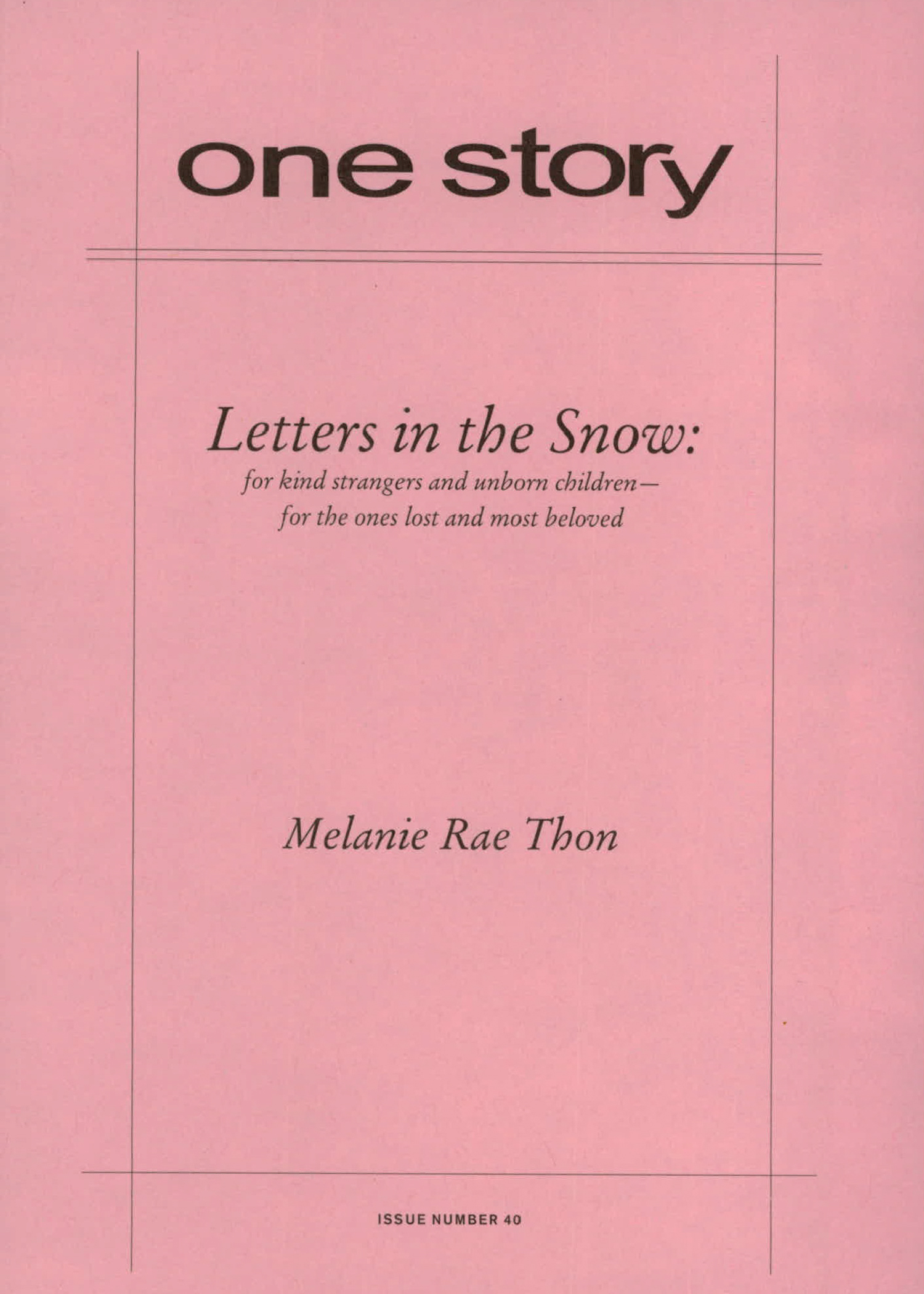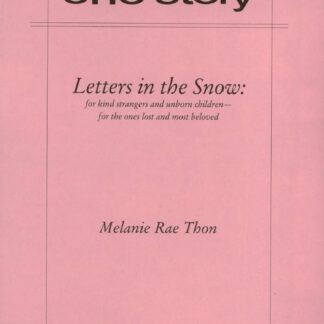
Letters in the Snow
$2.50
43 in stock
Excerpt
Sweet Lady in White!
I almost love you. I do love the way your red lipstick matched your little red purse so beautifully. I loved your white fur coat, soft and plush but not real. No creatures died for you. In this, as in all things, you are forever innocent.
We met by chance. Two days ago, I watched you choosing fruit and vegetables. Such bliss! One Fuji apple, green and rosy, one grapefruit blushing pink, one fat orange orange, one small bright banana. You held each piece of fruit as if to weigh it in your hand and heart, as if to see inside, beyond its perfect size and color.
You reminded me of my mother, once upon a time, not so long ago, when she remembered my name and knew me as her daughter, before her lips were cracked and her fingernails broken.
She said, I remember the important things. I remember that I love you. She couldn’t pull my name from the air, but when I said, Nicole, she nodded.
Melanie Rae Thon
Melanie Rae Thon is the author of three novels, Sweet Hearts, Iona Moon, and Meteors in August, and two short story collections, First, Body and Girls in the Grass. Her fiction has been included in Best American Short Stories (1995, 1996), and she has received grants from the National Endowment for the Arts, the Massachusetts Artist Foundation, the New York Foundation for the Arts, the Ohio Arts Council, and the Mrs. Giles Whiting Foundation. In 1996, Granta included her on its list of the 20 Best Young American Novelists. Originally from Montana, she has taught at Emerson College, Syracuse University, University of Massachusetts, and Ohio State University. She now teaches at the University of Utah in Salt Lake City.
Q&A by Hannah Tinti
- HT: Where did the idea for this story come from?
- MT: Two images converged. In the winter of 2000/2001, somebody broke into my parents’ cabin in Bitterroot Lake in northwestern Montana. Whoever it was didn’t take much—just some food and warm clothing—but s/he lived there several days, as if taking refuge. I started to wonder who this person was, and what dangers or difficulties s/he might be fleeing. Then in June of 2001, I had one of my weird accidents and battered my right eye rather spectacularly. Yes, a peacock bruise like Nicole’s, brilliant rings of violet, blue, and green. It was so extreme some people thought I’d painted it on, and others (strangers in grocery stores, for instance) winced in pain when they saw me. I noticed an odd pattern: suddenly men of all ages were flirting with me. I had my theories about this, and finally a man twenty years younger than I confessed: “There’s something irresistible about a battered woman.” Nicole came alive in my mind and body. I felt her. I began to know her. She was wonderfully mysterious to me and also frighteningly familiar.
- HT: What was the most challenging aspect of writing this story?
- MT: I always have this foolish idea that I’m going to write a perfectly spare yet marvelously complete ten-page story. I saw it all in my mind, Nicole’s letters of apology to Lydia and Cody and the Iylers, the people from whom she steals as she escapes from Dixon. Very brief, direct and elegant—that’s what I imagined. But I started asking who else was in her life, why she couldn’t go home, how the love with Dixon had begun and why it lasted. Suddenly the story seemed huge and unmanageable, and I had to surrender to complexity; I had to accept that it might take me years to know all these people as fully as I wished to know them.
- HT: Why did you choose the form of letters to tell this story?
- MT: When you write a letter to make amends, the act—the ritual of giving shape to feeling through language—is very deliberate and requires unwavering honesty and mindfulness. Nicole isn’t really writing “letters,” of course. She’s lost in the mountains in a snow storm, quite possibly dying from exposure. She would have to carve each letter of every word in the snow with her fingers or her whole body. She’s far too weak to even attempt this, but her attention and her intention is that concentrated. For Nicole, these letters, these offerings of explanation and apology, are the most important work of her life.
- HT: You weave the plot back and forth in time so effortlessly. Is this something that happened as you were writing it, or did you go back in and drop these names and hints for the reader to find their way?
- MT: This story feels like an experience to me. The interwoven tales emerged over time, from 2000-2004, and the layering was a natural part of the process. At some point, I always make a detailed timeline for myself so that I can keep the sequence of events and people’s ages straight, regardless of how the narrative spins.
- HT: Nicole has lived a difficult life, and yet, her tone throughout this story is one of gratitude and forgiveness. How did you come to that voice? Was it a conscious choice?
- MT: The voice emerged more clearly as I imagined all the people in Nicole’s life, especially her mother and Dixon. As Nicole says, she has been “washed clean by grief and guttered out by the strange sound of merciful laughter.” That merciful sound is Nicole’s own laughter. The mother who punished her so harshly is now a senile thief. Nicole feels the sorrow of this, the enormous loss, but she also sees the crimes they share with bemusement and acceptance. She’s extremely kind to Rose, though her mother no longer knows her. This seems like an amazing act of tenderness and generosity. I’m hoping Nicole will teach me. I don’t think we can experience mercy or believe in grace unless our hearts break open. That’s what’s happened to Nicole. She can ask for understanding because her compassion for her mother and Dixon, her insight regarding Lora’s bitter compromise, and her endless grief over her own lost children make her exquisitely aware of the fact that she is not alone in her pain: every living creature suffers. When we allow ourselves to feel this, to sink into the heart of this staggering recognition, we can no longer protect ourselves with the brittle shells of rage or pity or self-righteousness. Sorrow is something we share, something we can assuage only with loving kindness. Close to death as she is, Nicole is living every moment of her life in full apprehension of this belief.
- HT: Why are Nicole’s final letters to her father and rescuers?
- MT: Nicole wants to speak the whole truth. She longs to be embraced completely. Her father—who endured great physical diminishment and who no longer lives in his human body—is the only one who can hold her this way, without imposing any fear or desire of his own. Nicole doesn’t need a priest or a friend or her sister or Lydia Kobell to say she’s forgiven. She knows she’s forgiven. Her own capacity to love is her proof of this. Now she wishes to be in the presence of someone who can bear all her pain, someone she can trust absolutely. Isn’t this what we all want in the end, someone who will offer comfort no matter what we confess? Someone fearless enough to give his love without trying to change anything? Someone respectful enough to surrender to the mystery of what we can’t explain? I think Nicole understands and accepts the possibility that she will die, but she also holds onto the hope that she will live, physically and spiritually, and so her last letter is to her rescuers, a plea to them to keep faith in her. She may survive one more night, just as her father did in the hospital. She is calling upon his will and courage, even as she asks for his comfort.
- HT: Do you find the writing of novels vs. short stories very different? How?
- MT: I do hundreds of pages of exploration for a story, and spend years letting tales swell in my heart and mind, so that part of the process is very similar to writing a novel. But when I’m working on a story, there comes a time when I try to see it in its most spare form, when I try to extract two essential lines from every twenty pages of investigation. With a novel, that phase is less extreme: I might get lucky, salvage a paragraph or two from twenty pages!
- HT: What is the best bit of advice about writing you have ever received?
- MT: I received illumination from Richard Yates. He could read a story, anyone’s story, and see the vision that informed it. He could see all the beautiful, subtle things you wished you’d revealed. Richard Yates could explicate every delicate nuance of thought and show you the waves of emotion and history beneath each image, each gesture. He said what you couldn’t bear to say, what you hadn’t quite discovered or imagined. Now, if every reader were Richard Yates, we’d all be perfect writers already and there would be no need to develop or revise or explore our work! What I learned from these glorious, generous, spiritually inspired readings was what might be possible in time, what I and my classmates might be able to render if we were patient, if we loved our people, if we were willing to stay in their lives with them for many years, if we remained curious instead of making clever decisions about what we thought should happen. He gave me hope, a sense of awe and wonder for the whole mysterious process, and a deeper joy in the work of being human.
- HT: What are you working on now?
- MT: A collection of stories that I call prayers. Nicole’s story is one of those prayers.
